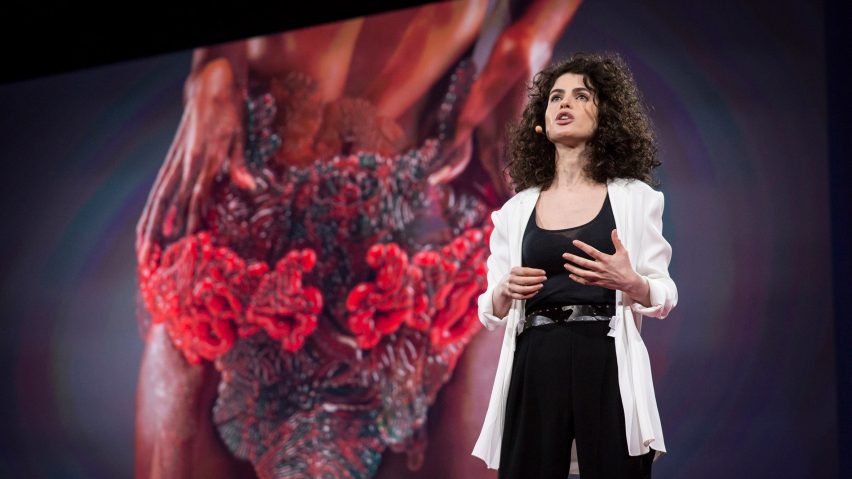Designer Neri Oxman has apologised to her students at MIT Media Lab for accepting funds from the late convicted sex offender Jeffrey Epstein.
The American-Israeli professor confirmed that her Mediated Matter Group received $125,000 from Epstein following a meeting in 2015. The financier was found dead in his prison cell in New York City last month, where he was awaiting trial for child sex-trafficking.
"I regret having received funds from Epstein, and deeply apologize to my students for their inadvertent involvement in this mess," Oxman said in a statement sent to Dezeen.
Oxman told to keep donations confidential
Oxman's apology follows the resignation of her boss, MIT Media Lab director Joi Ito, for allegedly covering up donations from Epstein.
Her Mediated Matter Group, which explores "nature-inspired design and design-
Oxman, who is currently on maternity leave, admitted giving a presentation of her group's work to Epstein in 2015.
She said she had been told to keep his donation confidential "so as not to enhance his reputation by association with MIT".
"In October 2015, Joi Ito, Director of the Media Lab, asked me to make a presentation about my group's research to Jeffrey Epstein along with other members of the MIT faculty who also presented their work," Oxman said in her statement.
"As part of my job at the Media Lab, I give presentations to sponsors and potential donors typically several times a week," the statement continued. "This was the first and only time I met Epstein."
Ito resigned earlier this month
Ito resigned from his post on 7 September following allegations in the New Yorker magazine that he made efforts to hide donations to the lab from Epstein. Ito had been under investigation since last month, following the revelation of the ties.
The former director is also accused of accepting the larger sum of $1.2 million dollars towards other investments that he held personally.
"Joi assured me that Epstein was an approved donor who wished to devote his fortune to science and technology, in part to make amends for wrongs he had committed earlier in his life," Oxman's statement said.
"Joi vouched for Epstein and his sincerity about his desire to do good. I took him at his word."
Epstein was first convicted of sex offences in 2008, and served 18 months in jail.
The scandal is the latest in a series of controversies over "toxic philanthropy" that has hit institutions including the Design Museum and the Serpentine Galleries in London, and the Whitney Museum in New York.
Oxman has pioneered "new ways of thinking"
Born in 1976, Oxman's influential work straddles art, architecture, design and technology.
The Museum of Modern Art in New York, which next year hosts an exhibition of her work titled Material Ecology, said she has "developed not only new ways of thinking about materials, objects, buildings, and construction processes, but also new frameworks for interdisciplinary—and even interspecies—collaborations".
The Mediated Matter Lab, which she founded, conducts research "at the intersection of computational design, digital fabrication, materials science, and synthetic biology".
Oxman's connection to Epstein was revealed last Friday by The Boston Globe, which reported that Ito twice asked her to write to Epstein, thanking him for his contributions.
The newspaper also reported that her lab produced "a grapefruit-sized, 3-D printed marble with a base that lit up", as a personal gift for Epstein that was delivered to his Manhattan apartment.
Epstein gave Mediated Matter Lab $125,000
Oxman said: "From Epstein's gifts to the Media Lab, my group received $125,000 with MIT's requirement that it be kept confidential so as to not enhance his reputation by association with MIT, and with the understanding that he would not be considered a sponsor of our group's research or have any involvement in how the funds were spent."
Her statement concluded: "I regret having received funds from Epstein, and deeply apologize to my students for their inadvertent involvement in this mess."
Recent projects by Oxman have included a commission for the Broken Nature: Design Takes on Human Survival exhibition at the Milan Triennale, that saw melanin – the pigment which defines human skin colour – applied to architecture; and a swarm of robots, called Fiberbots that autonomously create strong fibreglass tubes.

